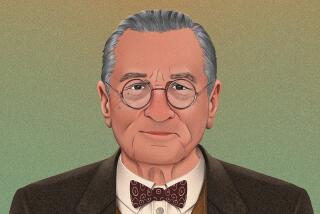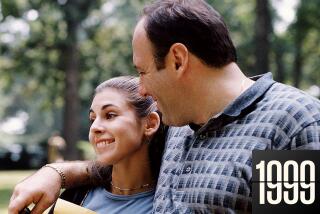‘Everybody’s Fine’
- Share via
“Relief” is the word for it. It’s a relief to see Robert De Niro giving an honest, effective starring performance in a project that does not stink and that, in fact, rises to a respectable level of filmmaking proficiency. How long has it been?
“Everybody’s Fine” may be as calculated a commercial product as the “Meet the Parents” and “Meet the Fockers” comedies (No. 3 to come next year), in which De Niro’s comic skills were stretched into cartoon broadness. But this Americanized remake of Giuseppe Tornatore’s 1990 “Stanno Tutti Bene” is gracefully acted by a very good cast headed by De Niro, relaxing into a comfortable pair of shoes originally worn by Marcello Mastroianni.
In the original, Mastroianni portrayed a Sicilian pensioner on a journey to visit his grown offspring, all of whom harbored secrets. The outline and various details of the original script remain in writer-director Kirk Jones’ Americanized adaptation. (Jones himself is English.) Frank Goode, a retired wire factory worker and recent widower, invites his four adult children to the upstate New York homestead for the holidays. One by one they stiff his invite, offering wobbly excuses by phone about work and vague details regarding the whereabouts of their vagabond New York City artist sibling, David.
Against doctors’ orders Frank hits the trail, traveling by train and bus, mostly, to see how the kids are doing, one city at a time. First New York, to no avail; then to Chicago, where tightly wound daughter Amy (Kate Beckinsale) works in advertising and lives in a sleek but soulless home seemingly untouched by human hands or marital warmth. From there, Frank ventures west to Denver to surprise his son Robert (Sam Rockwell), who Frank thinks is a conductor on the rise with a touring orchestra. Then it’s off to Las Vegas, where Rosie (Drew Barrymore), a performer, seems to be living well and baby-sitting for “a friend.”
The trek recalls Paul Mazursky’s lovely “Harry and Tonto” (1974), though “Everybody’s Fine” has little of Mazursky’s funk or looseness. It’s shot in a completely different style, neat and square and in sync with De Niro’s portrayal of a quietly demanding patriarch. Frequently Jones, who made “Waking Ned Devine,” isolates Frank in cavernous hallways and separates father and son or daughter by acres of metaphoric visual space. As written, scenes typically establish one point and then move on.
The payoffs are all in the interactions. Watch for the way De Niro, sitting down to dinner with the fractured Chicago wing of the family, responds to the uneasy dynamics at play. De Niro’s later scenes with Rockwell bring out an interesting combination of reserve and openness in both. In a too-brief scene, a trucker played by “Frozen River’s” Melissa Leo picks up Frank. Nothing happens of consequence, yet you’re reminded of how our best long-haul performers have a way of bringing a lifetime of experience to a simple two-person encounter.
No doubt some will feel they’ve been run over by the pathos van with this thing. It’s too bad Jones’ coda borders on emotional fraud. (Tornatore’s Italian original was pushier in its whimsy but more bittersweet at the core.) With gratifying reliability, however, the actors come riding to the rescue of the schematics.
“Everybody’s Fine” is content to be a simple, sincere heart-warmer. I’ll take it over “The Blind Side” by 40 yards.
More to Read
Only good movies
Get the Indie Focus newsletter, Mark Olsen's weekly guide to the world of cinema.
You may occasionally receive promotional content from the Los Angeles Times.










